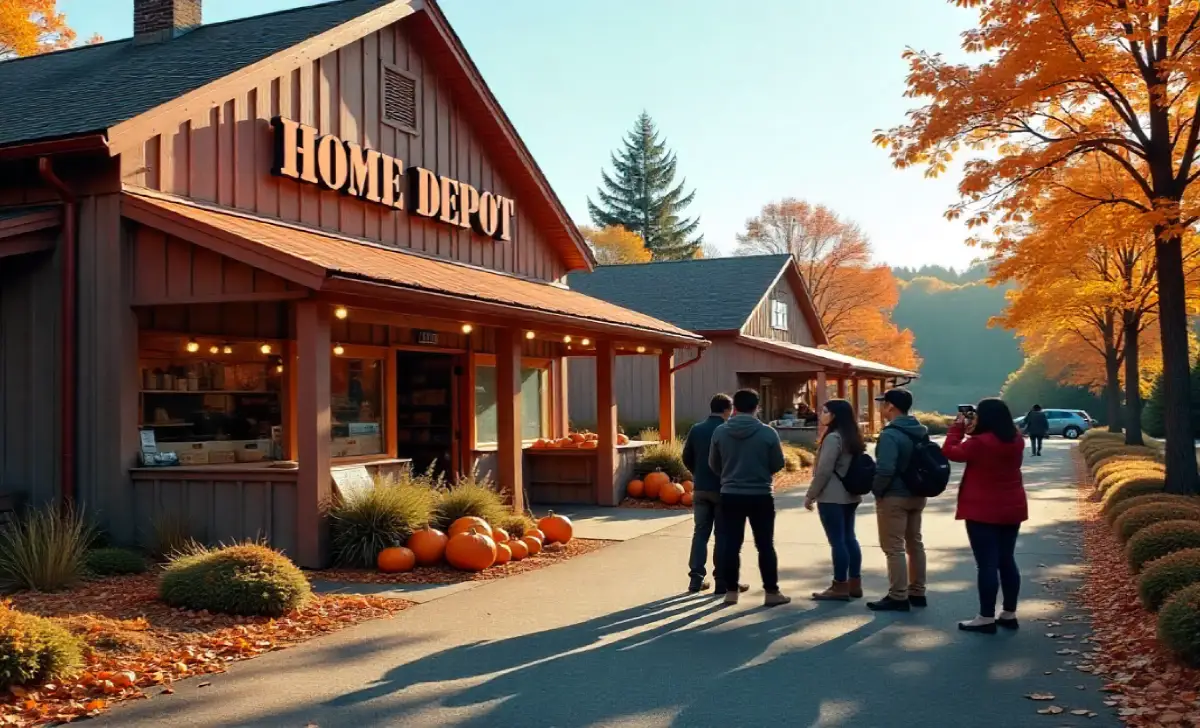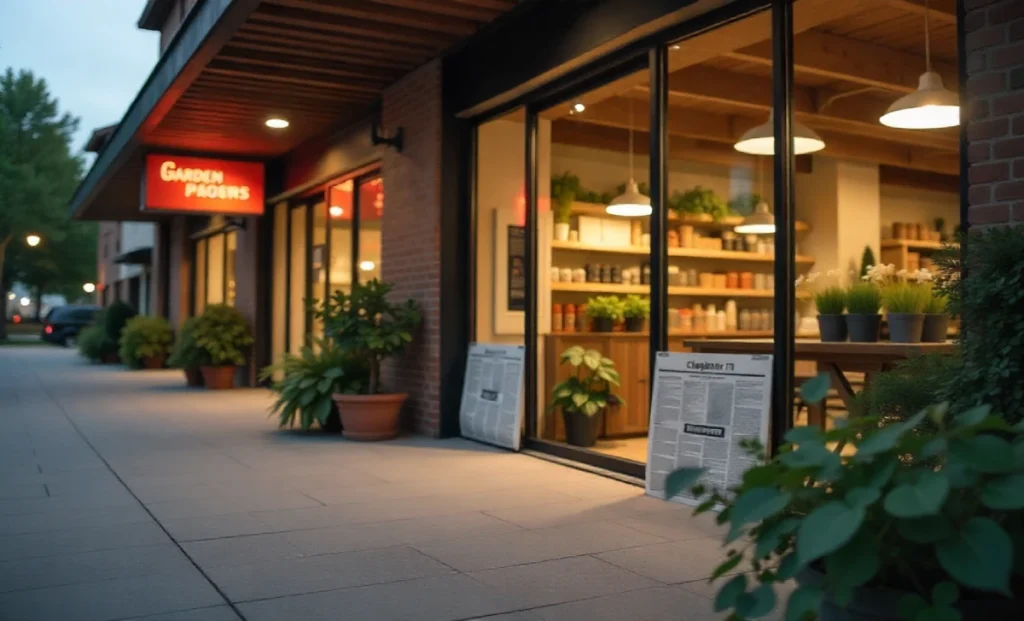The retail landscape just shifted again, and you might not have noticed it yet, as more companies file Chapter 11 bankruptcy to sell their assets.
Another Home Depot rival files for bankruptcy protection, joining a growing list of home improvement retailers struggling to survive in today’s market. McCammons Irish Market LLC, a garden center operator with locations in Indiana, recently filed for Chapter 11 bankruptcy protection to reorganize its debts and stay afloat.
This filing tells a bigger story about what’s happening to your local shopping options right now, especially as a debtor navigates bankruptcy court and faces potential closures.
The Numbers Don’t Lie About Market Control
Home improvement retail has become a three-horse race that leaves everyone else fighting for scraps, particularly as more companies file for bankruptcy protection.
Home Depot controls 27.2% of the market, Lowe’s grabs 17%, and Amazon takes 15.6% according to recent industry data regarding bankruptcy court for the district. These three giants combined control nearly 60% of all consumer spending in home improvement, creating an almost impossible environment for smaller competitors to thrive and grow, particularly as suppliers file for Chapter 11.
When you walk into a home improvement store, you’re likely shopping at one of these major chains. The remaining 40% of market share gets divided among hundreds of smaller retailers, regional chains, and specialty stores that struggle to compete on price and selection in the home improvement retail and wholesale sector.
McCammons Irish Market competed directly in the garden center space, selling flowering plants, vegetables, trees, and landscaping supplies. Their Chapter 11 filing lists assets and liabilities between $1 million and $10 million, with major creditors including nursery suppliers and horticultural companies.
The company offered tree installation services for as low as $125 each, trying to compete through pricing and personalized service, even as a rival files for chapter 11.
Why Home Depot Rivals Keep Filing Bankruptcy
Rising costs have crushed smaller retailers while bigger chains absorb the pressure more easily.
Inflation drives up labor expenses, product costs, and operational overhead faster than many companies can adjust their pricing strategies. Interest rates make borrowing money more expensive, limiting expansion plans and working capital access for growth-focused retailers, especially those at risk of filing Chapter 11.
Tariffs on imported goods hit home improvement retailers particularly hard since many tools, hardware, and materials come from overseas manufacturing. Small retailers can’t negotiate the same bulk pricing deals that major chains secure with international suppliers, especially when a supplier files for Chapter 11.
The housing market slowdown after the pandemic also reduced demand for home improvement projects and remodeling work, impacting retailers who rely on this sector as a debtor files Chapter 11. When fewer people buy homes or renovate existing properties, garden centers and specialty retailers lose customers who drive their seasonal revenue peaks.
Recent Chapter 11 Filings Paint a Troubling Picture
LL Flooring filed for Chapter 11 bankruptcy protection in August 2024, seeking an asset sale after struggling with housing market headwinds. The flooring retailer agreed to sell its assets and distribution centers to a private equity firm subsidiary for a fraction of their original value.
Gardener’s Supply Company’s parent organization also filed for Chapter 11 bankruptcy protection, seeking to sell assets to a stalking-horse bidder as financial distress mounted. America’s Gardening Resource Inc. and four affiliate companies listed liabilities potentially reaching $50 million in assets in their court petition.
Mosaic Companies LLC, a luxury tile and stone slab retailer, filed for Chapter 11 bankruptcy protection with plans to sell certain assets while liquidating other business segments. Each filing represents jobs lost, stores closed, and fewer shopping options for consumers seeking specialized products and services, especially when a rival files for chapter 11.
What Chapter 11 Bankruptcy Actually Means for These Companies
Chapter 11 bankruptcy protection gives struggling companies breathing room to reorganize their debts and operations without shutting down immediately, especially when a debtor files for Chapter 11.
Companies can negotiate with creditors, reject unfavorable contracts, and seek a sale of their assets while continuing to operate under court supervision. This process often leads to store closures, job cuts, and changes in product selection as retailers focus on profitable locations and merchandise, particularly when a competitor files for Chapter 11.
For consumers, Chapter 11 filings usually mean sales and clearance events as companies liquidate excess inventory. You might find good deals on remaining merchandise, but product availability becomes unpredictable as suppliers hesitate to ship new inventory to financially troubled retailers seeking a sale.
McCammons Irish Market’s Subchapter V petition indicates funds will be available to distribute to unsecured creditors, suggesting the company has valuable assets. Their garden center locations in Greenwood and Brownsburg could attract buyers interested in the real estate or existing customer relationships.
How This Affects Your Shopping Experience

Fewer independent retailers means less competition, which typically leads to higher prices and reduced product variety over time.
When a Home Depot rival files for bankruptcy under Chapter 11, you lose access to specialized knowledge and personalized service that smaller retailers often provide. Garden centers like McCammons Irish Market employ staff who understand local growing conditions, plant care, and seasonal challenges specific to their geographic area, which can be crucial if a rival files for Chapter 11.
Major chains focus on volume sales and standardized product lines that work across multiple regions but may not address your specific local needs. You might find lower prices at big box stores, but you could struggle to get expert advice about which plants thrive in your particular soil conditions or climate zone, especially as smaller rivals file for Chapter 11.
The consolidation also reduces convenient shopping locations, forcing you to drive further for specialty items or settle for a limited selection at nearby stores.
What Industry Experts Predict Happens Next
Market consolidation will likely continue as economic pressures persist and consumer spending patterns favor larger retailers with diverse product offerings, particularly as smaller rivals file for Chapter 11.
Regional home improvement chains that survive will need to find specific niches or services that major competitors don’t provide effectively, particularly as a home improvement retail and wholesale competitor files for bankruptcy. Some might focus on commercial customers, others on luxury or specialty residential projects that require expert consultation and custom solutions.
Online sales will continue growing, but home improvement products often require customers to see, touch, and evaluate items before purchasing, which could be challenging if a local supplier files for Chapter 11. This creates opportunities for retailers who combine digital convenience with physical showroom experiences and expert staff guidance.
The companies that emerge from Chapter 11 bankruptcy successfully often return as leaner operations focused on their most profitable locations and product categories, especially those seeking a sale.
Smart Shopping Strategies During Retail Uncertainty
Take advantage of clearance sales when retailers file for Chapter 11 bankruptcy to sell assets, but don’t rely on these stores for ongoing purchases or warranty service, as they may close unexpectedly.
Stock up on seasonal items like garden supplies, tools, or materials when you find good deals at closing stores. Just remember that return policies and customer service may be limited or unavailable after companies complete their bankruptcy proceedings.
Build relationships with multiple suppliers for important home improvement projects rather than depending on a single retailer. This approach protects you when stores close unexpectedly and ensures you have backup options for replacement parts or additional materials, especially if a rival files for Chapter 11.
Consider supporting local independent retailers when possible, even if prices are slightly higher, to maintain diverse shopping options in your community, especially as a debtor files Chapter 11.


